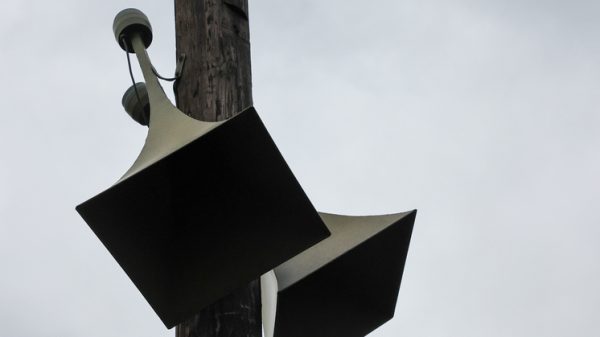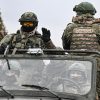
Protesters gather outside the Chinese embassy in Myanmar
Credit: Nyein Chan Naing/EPA-EFE/Shutterstock
Online crusaders in Myanmar have begun to hunt for the officer who opened fire on a young female anti-coup protester, leaving her fighting for her life with a serious brain injury.
It came as the United States imposed fresh sanctions against the ruling general.
Dominic Raab, the Foreign Secretary, announced on Wednesday the United Kingdom is "urgently" looking at its own punitive measures against the junta that seized power last week.
Mr Raab wrote on Twitter: "The international community will not accept the coup in Myanmar and we will hold those responsible to account.
"The UK welcomes [US president Joe Biden’s] steps today to send a strong message to the military regime.
"[The UK] is urgently looking at further measures under our own sanctions regime."
The international community will not accept the coup in Myanmar and we will hold those responsible to account. The UK welcomes @POTUS steps today to send a strong message to the military regime. 🇬🇧 is urgently looking at further measures under our own sanctions regimes.
— Dominic Raab (@DominicRaab) February 11, 2021
Mya Thwate Thwate Khaing should have been celebrating her 20th birthday on Thursday but instead she has become a rallying cry for a pro-democracy movement that is gaining pace across the country in opposition to a military takeover on February 1.
The young grocery worker was struck on Tuesday as she sheltered from a police water cannon during a mass rally in the capital Naypyitaw. Graphic phone footage of the incident showed the police firing weapons in the direction of the protesters, and a gunshot rings out as she drops to the ground.
Doctors have told her devastated family that she has little chance of survival. Amnesty International says it has verified footage of the incident and says "police recklessly targeted protesters” with live ammunition.
Images from the incident show a member of the police wielding a Myanmar-made variant of the Uzi sub-machine gun.
The accusations contradict Myanmar military claims that security forces were not carrying lethal weapons. The identity of the gunman remains unknown but Facebook and Twitter users have launched an online hunt.
Some have posted private details — including the home address and family business locations — of a man they suspect fired the bullet.
The target has denied the allegations and proclaimed his innocence in a Facebook post.
"On Facebook today, I am very sorry to see that my pictures (taken from my Facebook) are being compared to the picture of the police officer from the Naypyidaw shooting today," the man wrote in response.
"This misrepresentation has caused a great deal of damage."
Protests against the coup in Myanmar continued on Thursday, with thousands of people demonstrating outside China’s embassy in Yangon over allegations Beijing is supporting the junta and rumours that Chinese IT specialists had been flown in to help implement a controversial new cyber security law.
After orchestrating a coup and arresting the country’s civilian leaders on February 1, the military leadership is now pushing forward with a bill that would give it sweeping powers to ban content it dislikes, restrict internet providers and intercept data.
The Chinese embassy did not give an immediate response to the rally outside its gates but late on Wednesday, it used Facebook to post a denial of internet rumours that planes that arrived this week from China brought in technical personnel. It said the cargo flights were carrying seafood.
When asked about the reports, Chinese foreign ministry spokesman Wang Wenbin said there had been “false information and rumours” circulating about China on issues relating to Myanmar.
Beijing has denied it is backing the military junta, but its response to the generals’ sudden seizure of power has been muted, with China calling itself a “friendly neighbour” and urging all sides to “handle their differences.”

Suspicions are rife among the public that China supports the military coup
Credit: Nyein Chan Naing/EPA-EFE/Shutterstock
The UN Security Council last week called for the release of elected leader Aung San Suu Kyi and others detained by the military but stopped short of condemning the coup after objections from China and Russia.
The stance has increased existing suspicion in Myanmar that China could underpin the military’s political ambitions to preserve its own economic and strategic interests in the Southeast Asian nation.
Demonstrators outside the embassy held signs demanding Xi Jinping, the Chinese president, stop helping the coup, with slogans including “Dear Chinese government, don’t stay muted. This is not a Zoom meeting,” and “Stop interfering with our affairs of state.”
Thinzar Shunlei Yi, a local activist, told The Telegraph that conspiracy theories about Chinese involvement had been fuelled by the public’s perception of China’s long-standing support for the Myanmar military and its opaque public position. “It should make its policy clear,” she said.
She described the new bill, which the regime says aims to prevent the use of electronic technology to harm the state or its stability, as “worrying,” adding, “we are being threatened by this law.”
The 36-page draft bill proposes that internet providers would have to prevent or remove content deemed to “cause hatred, destroy unity and tranquillity” to be “untruthful news or rumours” or to be inappropriate to Myanmar’s culture, such as pornography.
The world’s biggest internet companies have joined advocacy groups in raising the alarm that the laws would harm fundamental rights and the economy by giving unprecedented censorship powers and violating privacy.
Around 3,000 people protested outside the Chinese embassy in Yangon this morning in response to rumours that China had sent IT technicians to help the junta control access to social media. #WhatsHappeningInMyanmar
Read more on our liveblog: https://t.co/3I5sZ5Pxb4 pic.twitter.com/kmHoAv2v2m
— Frontier Myanmar (@FrontierMM) February 11, 2021
It “would significantly undermine freedom of expression and represents a regressive step after years of progress,” said a statement from the Asia Internet Coalition, whose members include Apple, Facebook, Google and Amazon.
“For the people of Burma this is making Burma like North Korea,” said Kyaw Win, the executive director of the Burma Human Rights Network.
He predicted that while the cyber law would not have an immediate impact on the protesters who have relied heavily on social media to push their pro-democracy message, that “it will impact on communication very badly.”
This law could be “worse than in Hong Kong,” he warned, where Beijing imposed a controversial national security law to curb pro-democracy protests, that has seen activists threatened with severe punishments for online postings.
Last week, Myanmar’s military rulers banned Facebook, Twitter and other social media platforms used by critics, and blocked the internet for a day. Many fear this could happen again.
On Friday, the UN’s top human rights body is to consider a resolution drafted by Britain and the European Union that would condemn Myanmar’s military coup and demand urgent access for monitors, but China and Russia are again expected to try to temper the move.

























































Свежие комментарии